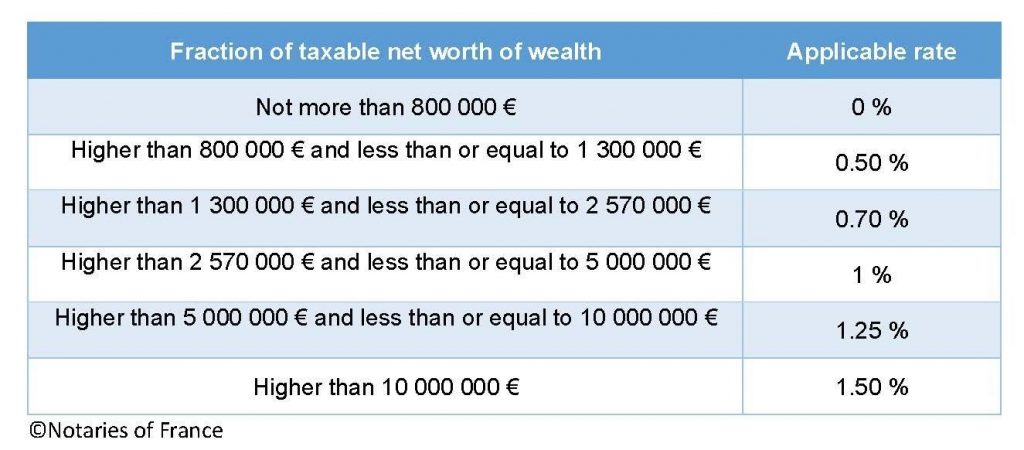
How does the French wealth tax work and will I have to pay it?
The wealth tax (Impôt sur la fortune immobilière) is known as IFI and is a tax on the real estate assets for individuals. It replaced the Impôt de solidarité sur la fortune tax (ISF) in January 2018. It is payable by taxpayers whose real estate assets exceeds a limit of 1,300,000 euros. The IFI is calculated at progressive rates from 800,000 euros (see table below). It is paid at the same time as income tax.
Who has to pay the wealth tax?
- If you are a fiscal resident, and therefore tax registered in France, you will be subject to the IFI, which is levied on all of your worldwide real estate assets.
- Individuals who are tax registered abroad, are subject to the IFI on the basis of their French property.
- People who return to France, after having resided abroad for the past 5 years are, during the 5 years following their return, taxed for the IFI only on their French property.
How does the taxation take place?
- The taxation is calculated per tax household.
- A person living alone counts as a full tax household.
- Married couples form the same tax household and are therefore subject to common taxation, regardless of their matrimonial property regime. However, there are 2 exceptions to the rule:
- When the spouses are married under the French regime of separation and they live separately, each of the spouses is liable to the IFI but solely on their personal holdings.
- When the spouses are in the midst of a legal separation or divorce, are authorized to live separately.
- People who live together, or those in a civil union, are also subject to common taxation on all of their assets.
NOTE: property belonging to minors forms part of the estate, and should be declared. On the other hand, any property belonging directly to adult children is not part of the taxable estate of their parents, even if the children have requested their incorporation, to their parents’ tax household, in terms of income tax.
When the net value of taxable assets exceeds 1.3 million euros, the Impôt sur la fortune immobilier is calculated using a progressive schedule
Which assets can be taxed with the wealth tax?
Subject to exemptions, the taxable property in terms of the Impôt sur la fortune immobilier, includes:
- Existing buildings (houses, apartments, etc.), and land or undeveloped buildings (agricultural land, open barns etc.). It should be noted that the main residence benefits from a 30% reduction on its value.
- Investments related to real estate: SCPI, OPCI
- A portion (relating to real estate assets) of the redemption value of an Assurance Vie.
Which assets are exempted from the wealth tax?
There are some exceptions:
- Professional real estate (which means property related to the main activity of the taxpayer and of his spouse, civil union partner, cohabiting partner, and minor children) including commercial property, retail units, medical offices, etc.). Professional furnished rentals are also entitled to this exemption.
- Up to 3/4 of their value, forests and woodland, as well as shares in forestry communities. However, shares in forestry investment plans are not included.
What deductions can be made?
There are deductions from any property related debt which is payable by the taxpayer on January 1 of the taxation year, including:
- Ongoing property loans (up to the amount of the remaining due capital).
- Costs related to property renovations, construction, reconstruction or enlargement works.
- taxes not yet paid on real estate properties, such as property tax. The housing tax is not deductible.
What is the tax rate schedule?
When the net value of taxable assets exceeds 1.3 million euros, the Impôt sur la fortune immobilier is calculated using a progressive schedule, which is the same as for the old wealth tax.

